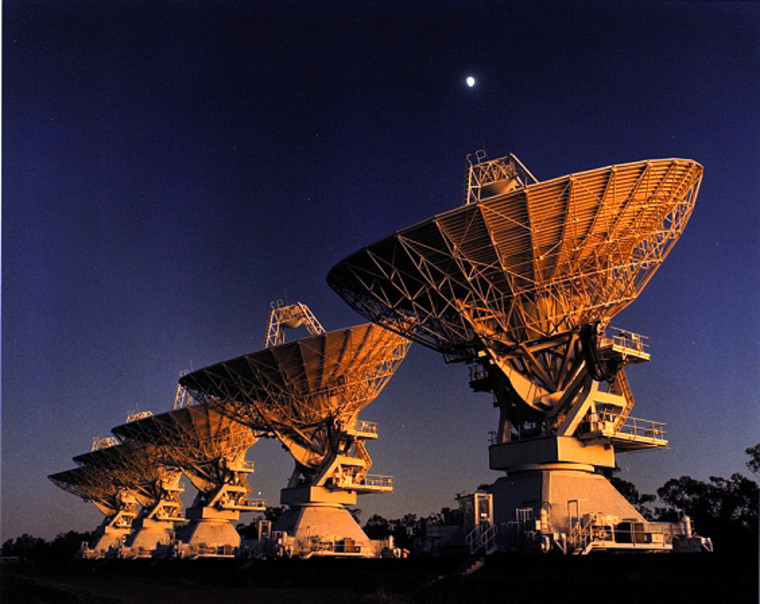This month the Royal Society held a two-day meeting to work out a "scientific and societal agenda" on extraterrestrial life, following up on a similar meeting in January. The discussions generated controversy, conspiracy theories and a little bit of acrimony. So what happened? I was there on both days, and here's the inside story.
Scientists are searching for extraterrestrial life in a number of different ways and places. One aspect of this is the search for extrasolar planets, on the basis that an Earthlike planet around a sunlike star might be a good place to look. The first super-Earths have been discovered, and the longer-term goal will be to undertake spectral analysis of the atmospheres of such exoplanets, looking for oxygen, ozone, water and other potential indicators of life. The recent excitement over Gliese 581g brings such work into focus — though even the very existence of this world is now the matter of some debate.
Other scientists believe our best chance of discovering alien life will be a human or robotic mission in our own solar system — probably to Mars — targeted at detecting extraterrestrial microbial life. But the controversy begins with the small but vociferous group of scientists who use radio telescopes to search the sky for a signal from other civilizations.

The radio search for extraterrestrial intelligence, or SETI, is celebrating its 50th anniversary this year. The lack of results has led to a reassessment of search strategies. Some exotic ideas about where to look and what to look for were discussed at the Royal Society meeting. Clement Vidal, a researcher at the Free University of Brussels, speculated that advanced civilizations might migrate toward black holes, not least because they represent the ultimate energy source. Steven Dick, formerly NASA’s chief historian, speculated that we might be living in a post-biological universe, dominated by artificial intelligence, on the basis that intelligences would be driven to improve and perpetuate.
When I heard the phrase "immortal thinking machines," I had to remind myself that I was at the Royal Society, not a sci-fi convention.
So what happens if SETI find a signal? Do we reply? Though not present, the shadow of Professor Stephen Hawking loomed large over the meeting. Earlier this year Hawking warned bluntly that contacting aliens could have catastrophic consequences for the human race. He likened this to the arrival of Christopher Columbus in the New World, and pointed out that matters didn’t turn out too well for the Native Americans. This echoed a remark made at the Royal Society’s January conference, when Professor Simon Conway Morris, a Cambridge University palaeontologist, said "if the cosmic phone rings, don’t answer."
Related to this question is the issue of active SETI, sometimes known as METI (messaging to extraterrestrial intelligence). This was discussed extensively at this month’s meeting, and that’s when things got heated.
Some SETI scientists want to move into METI. One reason is the theory that extraterrestrials might not initiate contact, but might respond to a message we send. Some METI has already been done – for example, the "Cosmic Calls" transmitted in 1999 and 2003 from the Evpatoria radar installation in Ukraine under the supervision of Alexander Zaitsev.
The SETI Institute's "Earth Speaks" project has attempted to engage the public on this and asks for suggestions on what we might transmit. The messages range from the poignant to the amusing, with my favorite being "Hi, be careful, we are deadly and it’s pretty boring here anyway so don’t bother coming."
Author and futurist David Brin felt strongly that there ought to be a moratorium on METI, until such time as an informed debate could take place. There was talk of "sages" being consulted, but no consensus on who those sages might be, or whether the other 6 billion of us might get a say. Brin felt objectors to METI were being ridiculed with Hollywood stereotypes about evil aliens and said this showed a disappointing lack of imagination. He asked what was wrong with having a debate on the subject, as such a debate would be responsible, interesting and fun.
Seth Shostak, senior astronomer at the SETI Institute, took the opposite view. He said that any attempts to proscribe METI were rooted in paranoia and would be anti-science. He saw no point in any consultation process, because it wasn’t clear who would have the right to decide, or how it would help us pick the right answer. He also wondered how, short of going to war, any moratorium could be enforced. Shostak and others have pointed out that the horse has left the barn long ago and that we’ve been a detectable civilization for decades anyway, due to our FM, television and radar signals. This point is disputed, but the question is unanswerable at present. We don’t know how big or powerful alien radio telescopes might be – if indeed such things exist.
Such are the debates that bedevil the SETI community, where scientists speculate about something which they can’t study and which we don’t even know is there at all.
The closest thing there is to any regulation of all this is the SETI community’s “Declaration of Principles Concerning the Conduct of the Search for Extraterrestrial Intelligence.” This revised document was unanimously adopted by the SETI Permanent Study Group of the International Academy of Astronautics on Sept. 30. It states that “In the case of the confirmed detection of a signal, signatories to this declaration will not respond without first seeking guidance and consent of a broadly representative international body, such as the United Nations”. However, none of this covers METI – and in any case, the agreement is between individuals and non-governmental organisations, not between nations.
One of the speakers at the Royal Society meeting was Professor Mazlan Othman, a Malaysian astrophysicist who is director of the U.N. Office for Outer Space Affairs. The week before the meeting, numerous media outlets carried a story that she was being appointed an “alien ambassador” – a spokeswoman for Planet Earth if E.T. comes calling. Rumors flew around the UFO and conspiracy theory communities that an alien signal had been detected and that an announcement was imminent. The Royal Society meeting itself was seen as being part of this process, and when the alien ambassador story was denied, this started rumors of a cover-up.
At the meeting, Othman made it clear that the story was false and derived from a mistaken interpretation of the point she did make – that is, that her U.N. office and the U.N. Committee on the Peaceful Uses of Outer Space, or COPUOS, might be appropriate forums for managing the global response to the discovery of extraterrestrial life.
Othman set out some ideas on the process whereby the various issues that would arise from the discovery or detection of extraterrestrial life – scientific, societal, legal and ethical – might be brought to the U.N. As a potential precedent for this process, she referred to the issue of potentially threatening near-Earth objects, which is being addressed by experts working with COPUOS and other organizations.
Her message was clear: "Come to COPUOS with a degree of consensus." But as the row over METI illustrates, we are a long way from consensus. Expect some interesting debates over the next few months and ... watch this space!
worked for the British Ministry of Defense for 21 years, and one of his jobs involved investigating UFO sightings. He now works as a freelance journalist and media commentator, covering wide range of subjects including the unexplained, conspiracy theories, space and science fiction.
